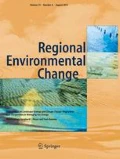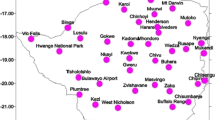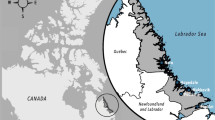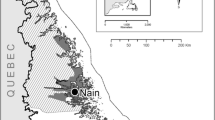Abstract
Climate change impacts on population health and wellbeing are spatially and socially distributed, and shape place-based capacities, constraints, and priorities for climate change adaptation. Inuit across the Circumpolar North have called for public health monitoring and response systems that integrate environmental and human health data, and provide localized information to support place-based adaptation strategies. The goal of this research was to qualitatively characterize how Inuit in Rigolet, Nunatsiavut, Labrador, Canada, identify, interpret, and use environmental and climatic observations to make decisions that will protect and promote their health and wellbeing in the context of climate change. Inuit community research leads conducted in-depth, semi-structured interviews with Rigolet Inuit to identify and contextualize environmental and climatic observations that were important for monitoring. Under the direction of community research leads, qualitative data from interviews were analyzed by the core research team using constant-comparative thematic analysis methods to ensure emergent findings were grounded in the voices and perspectives of Rigolet Inuit. Rigolet Inuit considered all climatic and environmental observations to be connected and emphasized the importance of collective, intergenerational knowledge in understanding and adapting to current and future climate change. The ways that Rigolet Inuit interpreted and used these observations for making decisions depended on perceived relevance and importance of observations, trustworthiness of information, and personal thresholds for risks. Knowledge shared by Rigolet Inuit demonstrated the nuanced, relational nature of how climatic and environmental observations are identified, interpreted, and used in decision-making for place-based climate change adaptation. It is important to prioritize these place-based and locally validated ways of knowing and learning about the land in the development of integrated monitoring systems to inform adaptation strategies that are based on a community’s existing resilience and creativity, and premised on relationships among people and places. In so doing, we can identify entry points for improving the ways in which monitoring systems function to link environment and health data, and inform robust, evidence-based adaptation strategies and policies.


Similar content being viewed by others
References
Abram N, Gattuso J-P, Prakash A, Cheng L, Paz Chidichimo M et al (2019) Framing and context of the report. In: Pörtner HO, Roberts DC, Masson-Delmotte V, Zhai P, Tignor M, Poloczanska E, Mintenbeck K, Alegría A, Nicolai M, Okem A, Petzold J, Rama B, Weyer NM (eds) IPCC special report on the ocean and cryosphere in a changing climate, pp 1–60. In press
Adger WN (2003) Social capital, collective action, and adaptation to climate change. Econ Geogr 79(4):387–404. https://doi.org/10.1111/j.1944-8287.2003.tb00220.x
Adger WN (2016) Place, well-being, and fairness shape priorities for adaptation to climate change. Glob Environ Chang 38:A1–A3. https://doi.org/10.1016/j.gloenvcha.2016.03.009
Adger WN, Barnett J, Brown K, Marshall N, O’Brien K (2013) Cultural dimensions of climate change impacts and adaptation. Nat Clim Chang 3:112–117. https://doi.org/10.1038/NCLIMATE1666
Alessa L, Kliskey A, Gamble J, Fidel M, Beaujean G et al (2015) The role of indigenous science and local knowledge in integrated observing systems: moving toward adaptive capacity indices and early warning systems. Sustain Sci 11:91–102. https://doi.org/10.1007/s11625-015-0295-7
Berry HL, Waite TD, Dear KBG, Capon AG, Murray V (2018) The case for systems thinking about climate change and mental health. Nat Clim Chang 8:282–290. https://doi.org/10.1038/s41558-018-0102-4
Bezabih M, Gebreegziabher Z, Borga L (2013) Social Capital, climate change and soil conservation investment: panel data evidence from the Highlands of Ethiopia (IDEAS Working Paper Series from RePEc, 2013). Retrieved from https://search-proquest-com.qe2a-proxy.mun.ca/docview/1698742493?rfr_id=info%3Axri%2Fsid%3Aprimo
Birks M, Chapman Y, Francis K (2008) Memoing in qualitative research: probing data and processes. J Res Nurs 13(1):68–75. https://doi.org/10.1177/1744987107081254
Boeije H (2002) A purposeful approach to the constant comparative method in the analysis of qualitative interviews. Qual Quant 36:391–409. https://doi.org/10.1023/A:10209529486
Breslow SJ, Sojka B, Barnea R, Basurto X, Carothers C et al (2016) Conceptualizing and operationalizing human wellbeing for ecosystem assessment and management. Environ Sci Policy 66:250–259. https://doi.org/10.1016/j.envsci.2016.06.023
Breslow SJ, Allen M, Holstein D, Sojka B, Barnea R et al (2017) Evaluating indicators of human well-being for ecosystem-based management. Ecosyst Heal Sustain 3(12):1–18. https://doi.org/10.1080/20964129.2017.1411767
Brunet ND, Hickey GM, Humphries MM (2014) The evolution of local participation and the mode of knowledge production in Arctic research. Ecol Soc 19(2):69. https://doi.org/10.5751/ES-06641-190269
Butler CD, Harley D (2010) Primary, secondary and tertiary effects of eco-climatic change: the medical response. Postgrad Med J 86(1014):230–234. https://doi.org/10.1136/pgmj.2009.082727
Castleden HE, Hart C, Harper SL, Martin D, Cunsolo A (2017) Implementing Indigenous and Western knowledge systems in water research and management (Part 1): a systematic realist review to inform water policy and governance in Canada. Int Indigen Pol J 2(4). https://doi.org/10.18584/iipj.2017.8.4.6
Charmaz K (2006) Constructing grounded theory: a practical guide through qualitative analysis, 1st edn. SAGE, London
Clark DG, Ford JD (2017) Emergency response in a rapidly changing Arctic. Can Med Assoc J 189(4):E135–E136. https://doi.org/10.1503/cmaj.161085
Clark DG, Ford JD, Pearce T, Berrang-Ford L (2016) Vulnerability to unintentional injuries associated with land-use activities and search and rescue in Nunavut, Canada. Soc Sci Med 169:18–26. https://doi.org/10.1016/j.socscimed.2016.09.026
Comiso JC, Hall DK (2014) Climate trends in the Arctic as observed from space. WIREs Clim Chang 5:389–409. https://doi.org/10.1002/wcc.277
Creswell JW, Miller DL (2000) Determining validity in qualitative inquiry. Theory Pract 39(3):124–130. https://doi.org/10.1207/s15430421tip3903
Cunsolo A, Ellis NR (2018) Ecological grief as a mental health response to climate change-related loss. Nat Clim Chang 8:275–281. https://doi.org/10.1038/s41558-018-0092-2
Cunsolo Willox A, Harper SL, Ford JD, Landman K, Houle K et al (2012) “From this place and of this place:” Climate change, sense of place, and health in Nunatsiavut, Canada. Soc Sci Med 75(3):538–547. https://doi.org/10.1016/j.socscimed.2012.03.043
Cunsolo Willox A, Harper SL, Edge VL, Landman K, Houle K et al (2013a) The land enriches the soul: on climatic and environmental change, affect, and emotional health and well-being in Rigolet, Nunatsiavut, Canada. Emot Space Soc 6:14–24. https://doi.org/10.1016/j.emospa.2011.08.005
Cunsolo Willox A, Harper SL, Ford JD, Edge VL, Landman K et al (2013b) Climate change and mental health: an exploratory case study from Rigolet, Nunatsiavut, Canada. Clim Chang 121(2):255–270. https://doi.org/10.1007/s10584-013-0875-4
Cunsolo Willox A, Stephenson E, Allen J, Bourque F, Drossos A et al (2015) Examining relationships between climate change and mental health in the Circumpolar North. Reg Environ Chang 15:169–182. https://doi.org/10.1007/s10113-014-0630-z
Darroch F, Giles A (2014) Decolonizing health research: community-based participatory research and postcolonial feminist theory. Canadian J Action Res 15(3):22–36. https://doi.org/10.33524/cjar.v15i3.155
Davidson-Hunt I, Berkes F (2003) Learning as you journey: Anishinaabe perception of social-ecological environments and adaptive learning. Ecol Soc 8(1). https://doi.org/10.5751/es-00587-080105
Driscoll DL, Mitchell E, Barker R, Johnston JM, Renes S (2016) Assessing the health effects of climate change in Alaska with community-based surveillance. Clim Chang 137:455–466. https://doi.org/10.1007/s10584-016-1687-0
Ebi KL, Semenza JC (2008) Community-based adaptation to the health impacts of climate change. Am J Prev Med 35(5):501–507. https://doi.org/10.1016/j.amepre.2008.08.018
Ellis NR, Albrecht GA (2017) Climate change threats to family farmers’ sense of place and mental wellbeing: a case study from the Western Australian Wheatbelt. Soc Sci Med 175:161–168. https://doi.org/10.1016/j.socscimed.2017.01.009
Etches V, Frank J, Di Ruggiero E, Manuel D (2006) Measuring population health: a review of indicators. Annu Rev Public Health 27:29–55. https://doi.org/10.1146/annurev.publhealth.27.021405.102141
Fereday J, Muir-Cochrane E (2006) Demonstrating rigor using thematic analysis: a hybrid approach of inductive and deductive coding and theme development. Int J Qual Methods 5(1):80–92. https://doi.org/10.1063/1.2011295
Ford JD, Cunsolo Willox A, Chatwood S, Furgal CM, Harper SL et al (2014) Adapting to the effects of climate change on Inuit health. Am J Public Health 104(SUPPL. 3):e9–e17. https://doi.org/10.2105/AJPH.2013.301724
Ford JD, Sherman M, Berrang-Ford L, Llanos A, Carcamo C et al (2018) Preparing for the health impacts of climate change in Indigenous communities: the role of community-based adaptation. Global Environ Chang 49:129–139. https://doi.org/10.1016/j.gloenvcha.2018.02.006
Ford JD, Clark D, Pearce T, Berrang-Ford L, Copland L et al (2019) Changing access to ice, land and water in Arctic communities. Nat Clim Chang 9(4):335–339. https://doi.org/10.1038/s41558-019-0435-7
Forsyth T (2013) Community-based adaptation: a review of past and future challenges. Wiley Interdiscip Rev Clim Chang 4(5):439–446. https://doi.org/10.1002/wcc.231
Foster JW, Chiang F, Burgos RI, Cáceres RE, Tejada CM et al (2012) Community-based participatory research and the challenges of qualitative analysis enacted by lay, nurse, and academic researchers. Res Nursing Health 35:550–559. https://doi.org/10.1002/nur.21494
Fritz-Vietta NVM, Tahirindraza HS, Stoll-Kleemann S (2017) Local people’s knowledge with regard to land use activities in southwest Madagascar—conceptual insights for sustainable land management. J Environ Manag 199(May):126–138. https://doi.org/10.1016/j.jenvman.2017.05.034
Frumkin H, Hess J, Luber G, Malilay J, McGeehin M (2008) Climate change: the public health response. Am J Public Health 98(3):435–445. https://doi.org/10.2105/AJPH.2007.119362
Glaw X, Inder K, Kable A, Hazelton M (2017) Visual methodologies in qualitative research: autophotography and photo elicitation applied to mental health research. Int J Qual Methods 16:1–8. https://doi.org/10.1177/1609406917748215
Graham S, Barnett J, Fincher R, Hurlimann A, Mortreux C et al (2013) The social values at risk from sea-level rise. Environ Impact Assess Rev 41:45–52. https://doi.org/10.1016/j.eiar.2013.02.002
Hall WA, Long B, Bermbach N, Jordan S, Patterson K (2005) Qualitative teamwork issues and strategies: coordination through mutual adjustment. Qual Health Res 15(3):394–410. https://doi.org/10.1177/1049732304272015
Harper SL, Edge VL, Schuster-Wallace CJ, Berke O, McEwen SA (2011) Weather, water quality and infectious gastrointestinal illness in two Inuit communities in Nunatsiavut, Canada: potential implications for climate change. EcoHealth 8(1):93–108. https://doi.org/10.1007/s10393-011-0690-1
Harper SL, Edge VL, Cunsolo Willox A, The Rigolet Inuit Community Government (2012) “Changing climate, changing health, changing stories” profile: using an EcoHealth approach to explore impacts of climate change on Inuit health. EcoHealth 9:89–101. https://doi.org/10.1007/s10393-012-0762-x
Harper SL, Edge VL, Ford JD, Cunsolo Willox A, Wood M et al (2015a) Climate-sensitive health priorities in Nunatsiavut, Canada. BMC Public Health 15(1):605. https://doi.org/10.1186/s12889-015-1874-3
Harper SL, Edge VL, Ford JD, Kate Thomas M, Pearl DL et al (2015b) Healthcare use for acute gastrointestinal illness in two Inuit communities: Rigolet and Iqaluit, Canada. Int J Circumpolar Health 74(1):2242–3982. https://doi.org/10.3402/ijch.v74.26290
Harper SL, Edge VL, Ford JD, Thomas MK, Pearl DL et al (2015c) Acute gastrointestinal illness in two Inuit communities: burden of illness in Rigolet and Iqaluit, Canada. Epidemiol Infect 143(14):3048–3063. https://doi.org/10.1017/S0950268814003744
Houghton A, English P (2014) An approach to developing local climate change environmental public health indicators, vulnerability assessments, and projections of future impacts. J Environ Public Health 2014:1–7. https://doi.org/10.1155/2014/132057
Hulme M (2010) Problems with making and governing global kinds of knowledge. Glob Environ Chang 20:558–564. https://doi.org/10.1016/j.gloenvcha.2010.07.005
IPCC (2018) Global warming of 1.5°C. In: Masson-Delmotte V, Zhai P, Pörtner H-O, Roberts D, Skea J, Shukla PR, Pirani A, Moufouma-Okia W, Péan C, Pidcock R, Connors S, Matthews JBR, Chen Y, Zhou X, Gomis MI, Lonnoy E, Maycock T, Tignor M, Waterfield T (eds) An IPCC Special Report on the impacts of global warming of 1.5°C above pre-industrial levels and related global greenhouse gas emission pathways, in the context of strengthening the global response to the threat of climate change In press
Inuit Tapiriit Kanatami [ITK] (2018) National Inuit Strategy on Research. Ottawa, ON Retrieved from https://www.itk.ca/national-strategy-on-research/
Inuit Tapiriit Kanatami [ITK] (2019) National Inuit Climate Change Strategy. Ottawa. Retrieved from https://www.itk.ca/wp-content/uploads/2019/06/ITK_Climate-Change-Strategy_English_lowres.pdf
Kovats RS, Ebi KL (2006) Heatwaves and public health in Europe. Eur J Pub Health 16(6):592–599. https://doi.org/10.1093/eurpub/ckl049
Kvale S (1996) Interviews: an introduction to qualitative research interviewing. SAGE, Thousand Oaks
Lacey J, Howden M, Cvitanovic C, Colvin RM (2018) Understanding and managing trust at the climate science-policy interface. Nat Clim Chang 8:22–28. https://doi.org/10.1038/s41558-017-0010-z
Loring PA, Hinzman MS (2018) “They’re all really important, but…”: unpacking how people prioritize values for the marine environment in Haida Gwaii, British Columbia. Ecol Econ 152:367–377. https://doi.org/10.1016/j.ecolecon.2018.06.020
Malterud K (2001) Qualitative research: standards, challenges, and guidelines. Lancet 358(9280):483–488. https://doi.org/10.1016/S0140-6736(01)05627-6
Martin D, Bélanger D, Gosselin P, Brazeau J, Furgal C et al (2007) Drinking water and potential threats to human health in Nunavik: adaptation strategies under climate change conditions. Arctic 60(2):195–202. https://doi.org/10.1016/j.neuroimage.2009.09.064
McMichael AJ, Lindgren E (2011) Climate change: present and future risks to health, and necessary responses. J Intern Med 270(5):401–413. https://doi.org/10.1111/j.1365-2796.2011.02415.x
Meredith M, Sommerkorn M, Cassotta S, Derksen C, Ekaykin A et al (2019) Polar regions. In: Pörtner HO, Roberts DC, Masson-Delmotte V, Zhai P, Tignor M, Poloczanska E, Mintenbeck K, Alegría A, Nicolai M, Okem A, Petzold J, Rama B, Weyer NM (eds) IPCC special report on the ocean and cryosphere in a changing climate In press
Milford C, Kriel Y, Njau I, Nkole T, Gichangi P et al (2017) Teamwork in qualitative research: descriptions of a Multicountry Team Approach Demonstration of the advantages of having context-specific researchers coding and analyzing qualitative data. Int J Qual Methods 16:1–10. https://doi.org/10.1177/1609406917727189
Moulton AD, Schramm PJ (2017) Climate change and public health surveillance: toward a comprehensive strategy. J Public Health Manag Pract 23(6):618–626. https://doi.org/10.1097/PHH.0000000000000550
Nakamura N (2014) What is a community’s desire? A critical look at participatory research projects with Indigenous communities. Soc Cult Geogr 16:1–18. https://doi.org/10.1080/14649365.2014.959549
Navi M, Hansen A, Nitschke M, Hanson-Easey S, Pisaniello D (2017) Developing health-related indicators of climate change: Australian stakeholder perspectives. Int J Environ Res Public Health 14(5):552. https://doi.org/10.3390/ijerph14050552
Ostapchuk J, Harper SL, Cunsolo Willox A, Edge VL, The Rigolet Inuit Community Government (2015) Exploring Elders’ and seniors’ perceptions of how climate change is impacting health and well-being in Rigolet, Nunatsiavut. Int J Indigen Health 9(2):6–24. https://doi.org/10.18357/ijih92201214358
Pestronk RM (2010) Using metrics to improve population health. Prev Chronic Dis 7(4). Retrieved from http://www.cdc.gov/pcd/issues/2010/jul/10_0018.htm. Accessed [date]
Petrasek MacDonald J, Harper SL, Cunsolo Willox A, Edge VL, The Rigolet Inuit Community Government (2013) A necessary voice: climate change and lived experiences of youth in Rigolet, Nunatsiavut, Canada. Glob Environ Chang 23(1):360–371. https://doi.org/10.1016/j.gloenvcha.2012.07.010
Petrasek MacDonald J, Cunsolo Willox A, Ford JD, Shiwak I, Wood M et al (2015) Protective factors for mental health and well-being in a changing climate: perspectives from Inuit youth in Nunatsiavut, Labrador. Soc Sci Med 141:133–141. https://doi.org/10.1016/j.socscimed.2015.07.017
Reid H, Alam M, Berger R, Cannon T, Huq S et al (2009) Community-based adaptation to climate change: an overview. Participatory Learning and Action, vol 60. IIED, London, pp 11–33
Rodríguez LO, Cisneros E, Pequeño T, Fuentes MT, Zinngrebe Y (2018) Building adaptive capacity in changing social-ecological systems: integrating knowledge in communal land-use planning in the Peruvian Amazon. Sustainability (Switzerland) 10(2). https://doi.org/10.3390/su10020511
Roy J, Tschakert P, Waisman H, Abdul Halim S, Antwi-Agyei P et al (2018) Sustainable development, poverty eradication and reducing inequalities. In: Masson-Delmotte V, Zhai P, Pörtner H-O, Roberts D, Skea J, Shukla PR, Pirani A, Moufouma-Okia W, Péan C, Pidcock R, Connors S, Matthews JBR, Chen Y, Zhou X, Gomis MI, Lonnoy E, Maycock T, Tignor M, Waterfield T (eds) Global Warming of 1.5°C. An IPCC Special Report on the impacts of global warming of 1.5°C above pre-industrial levels and related global greenhouse gas emission pathways, in the context of strengthening the global response to the threat of climate change, sustainable development, and efforts to eradicate poverty In press
Saptutyningsih E, Diswandi D (September 2018) Jaung W (2020) Does social capital matter in climate change adaptation? A lesson from agricultural sector in Yogyakarta. Indonesia. Land Use Policy 95:104189. https://doi.org/10.1016/j.landusepol.2019.104189
Sawatzky A, Cunsolo A, Jones-Bitton A, Middleton J, Harper SL (2018) Responding to climate and environmental change impacts on human health via integrated surveillance in the circumpolar north: a systematic realist review. Int J Environ Res Public Health 15(12):2706. https://doi.org/10.3390/ijerph15122706
Sawatzky A, Cunsolo A, Harper SL, Shiwak I, Wood M et al (2019) “We have our own way”: exploring pathways for wellbeing among Inuit in Nunatsiavut, Labrador, Canada. In: Fleming C, Manning M (eds) Routledge Handbook of Indigenous Wellbeing. Routledge, United Kingdom, pp 223–236
Sawatzky A, Cunsolo A, Jones-Bitton A, Gillis D, Wood M et al (2020) “The best scientists are the people that’s out there”: Inuit-led integrated environment and health monitoring to respond to climate change in the Circumpolar North. Clim Chang 160:45–66. https://doi.org/10.1007/s10584-019-02647-8
Semenza JC (2015) Prototype early warning systems for vector-borne diseases in Europe. Int J Environ Res Public Health 12(6):6333–6351. https://doi.org/10.3390/ijerph120606333
Semenza JC, Suk JE, Estevez V, Ebi KL, Lindgren E (2012) Mapping climate change vulnerabilities to infectious diseases in Europe. Environ Health Perspect 120(3):385–392. https://doi.org/10.1289/ehp.1103805
Semenza JC, Trinanes J, Lohr W, Sudre B, Löfdahl M et al (2017) Environmental suitability of Vibrio infections in a warming climate: an early warning system. Environ Health Perspect 125(10):107004. https://doi.org/10.1289/EHP2198
Simonds VW, Christopher S (2013) Adapting western research methods to indigenous ways of knowing. Am J Public Health 103(12):2185–2192. https://doi.org/10.2105/AJPH.2012.301157
Statistics Canada (2017) 2016 census profile for rigolet, newfoundland and labrador. Retrieved October 14, 2017, from http://www12.statcan.gc.ca/census-recensement/2016/dp-pd/prof/details/page.cfm?Lang=E&Tab=1&Geo1=CSD&Code1=1011010&Geo2=PR&Code2=10&Data=Count&SearchText=Rigolet&SearchType=Begins&SearchPR=01&B1=All&TABID=2
Thornberg R, Charmaz K (2014) Grounded theory and theoretical coding. In: Flick U (ed) The SAGE handbook of qualitative data analysis. SAGE Publications, London, pp 153–170. https://doi.org/10.4135/9781446282243
Tong S, Ebi K (2019) Preventing and mitigating health risks of climate change. Environ Res 174:9–13. https://doi.org/10.1016/j.envres.2019.04.012
Tschakert P, Barnett J, Ellis NR, Lawrence C, Tuana N et al (2017) Climate change and loss, as if people mattered: values, places, and experiences. Wiley Interdiscip Rev: Clim Chang 8(5):1–19. https://doi.org/10.1002/wcc.476
Tuhiwai Smith L (2012) Decolonizing methodologies: research and indigenous peoples (Second). Otago University Press, Dunedin
Vasileiou K, Barnett J, Thorpe S, Young T (2018) Characterising and justifying sample size sufficiency in interview-based studies: systematic analysis of qualitative health research over a 15-year period. BMC Med Res Methodol 18(1):148. https://doi.org/10.1186/s12874-018-0594-7
Watts N, Adger WN, Agnolucci P, Blackstock J, Byass P et al (2015) Health and climate change: policy responses to protect public health. Lancet 386(10006):1861–1914. https://doi.org/10.1016/S0140-6736(15)60854-6
Watts N, Amann M, Ayeb-Karlsson S, Belesova K, Bouley T et al (2017) The Lancet Countdown on health and climate change: from 25 years of inaction to a global transformation for public health. Lancet 391(10120):P581–P630. https://doi.org/10.1016/S0140-6736(17)32464-9
Wenzel GW (2009) Canadian Inuit subsistence and ecological instability—if the climate changes, must the Inuit? Polar Res 28(1):89–99. https://doi.org/10.1111/j.1751-8369.2009.00098.x
WHO (2017) WHO | Public health surveillance. Retrieved November 3, 2017, from http://www.who.int/topics/public_health_surveillance/en/
Williams P, Alessa L, Abatzoglou JT, Kliskey A, Witmer F et al (2018) Community-based observing networks and systems in the Arctic: human perceptions of environmental change and instrument-derived data. Reg Environ Chang 18:547–559. https://doi.org/10.1007/s10113-017-1220-7
Acknowledgements
Sincerest thanks to the community of Rigolet and the many other people involved in this research for sharing their stories, wisdom, and hospitality. There are no words that can express how deeply humbled we are to be working alongside all of you, and how grateful we are for the guidance and leadership you provide that makes this work possible. We would like to acknowledge, honour, and pay respect to the homelands of the Innu and Inuit in Labrador, recognizing their ancestral and continued ties to the lands and waters wherein this research was conducted. We would also like to respectfully acknowledge the Dish with One Spoon territory, the Treaty lands and territory of the Mississaugas of the Credit, and the Between the Lakes Purchase (Treaty 3) on which the University of Guelph resides, and the traditional lands of the Cree, Blackfoot, and Métis peoples of Treaty 6 Territory where the University of Alberta resides. The authors would like to acknowledge Isaac Bell for his contributions to data team analysis sessions. Finally, we would like to thank our funders: Canadian Institutes of Health Research, Health Canada’s First Nations and Inuit Health Branch, the Northern Scientific Training Program, and POLAR Knowledge Canada.
Author information
Authors and Affiliations
Consortia
Corresponding authors
Additional information
Communicated by Wolfgang Cramer
Publisher’s note
Springer Nature remains neutral with regard to jurisdictional claims in published maps and institutional affiliations.
Rights and permissions
About this article
Cite this article
Sawatzky, A., Cunsolo, A., Shiwak, I. et al. “It depends…”: Inuit-led identification and interpretation of land-based observations for climate change adaptation in Nunatsiavut, Labrador. Reg Environ Change 21, 54 (2021). https://doi.org/10.1007/s10113-021-01772-4
Received:
Accepted:
Published:
DOI: https://doi.org/10.1007/s10113-021-01772-4




